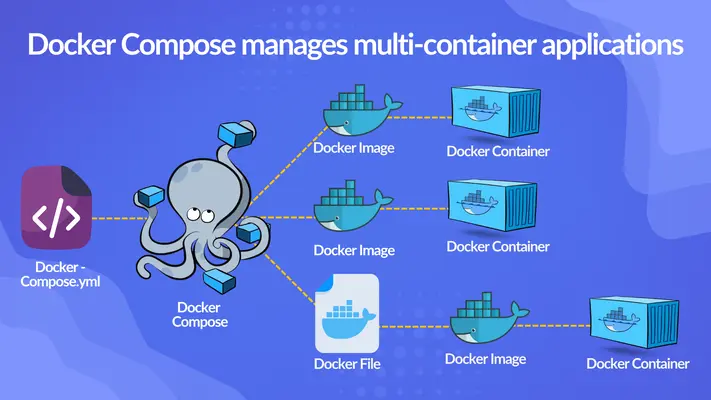Managing modern applications often means working with multiple interconnected services—think a backend API, frontend UI, and a database—all running in their own containers. Docker Compose is a powerful tool that simplifies the orchestration of these multi-container applications.
What is Docker Compose?
Docker Compose is a tool that allows you to define and manage multi-container Docker applications using a simple YAML file. Instead of starting each container manually, Docker Compose lets you run all your services with a single command: docker-compose up.
Why Use Docker Compose?
Here are some key benefits:
- Simplified configuration: Define services, networks, and volumes in one
docker-compose.ymlfile. - Quick startup: Launch the entire application stack with a single command.
- Consistency: Run the same environment across development, testing, and production.
- Isolation: Each container runs in its own isolated environment, reducing conflicts.
Use Case Example: A Simple Web App
Imagine you’re building a web application with:
- A React frontend
- A Node.js backend API
- A MongoDB database
Managing these three components individually could be time-consuming. With Docker Compose, you can define all of them in a single file:
yamlCopyEditversion: '3.8'
services:
frontend:
build: ./frontend
ports:
- "3000:3000"
depends_on:
- backend
backend:
build: ./backend
ports:
- "5000:5000"
depends_on:
- db
db:
image: mongo
ports:
- "27017:27017"
volumes:
- db-data:/data/db
volumes:
db-data:
This configuration allows all containers to communicate and start in the right order.
How to Use Docker Compose
- Install Docker & Docker Compose (most Docker Desktop installations already include Compose).
- Create a
docker-compose.ymlfile in your project root. - Build and run your app: bashCopyEdit
docker-compose up --build - Stop containers with: bashCopyEdit
docker-compose down
Tips for Using Docker Compose Efficiently
- Use environment variables for sensitive data.
- Use the
depends_ondirective wisely; it doesn’t wait for a service to be “ready” — just started. - Separate development and production configurations using multiple Compose files (e.g.,
docker-compose.override.yml).
Conclusion
Docker Compose is an essential tool for developers working with multi-container applications. Whether you’re developing microservices or just trying to streamline your local development workflow, Docker Compose can help you reduce setup time and improve consistency across environments.

